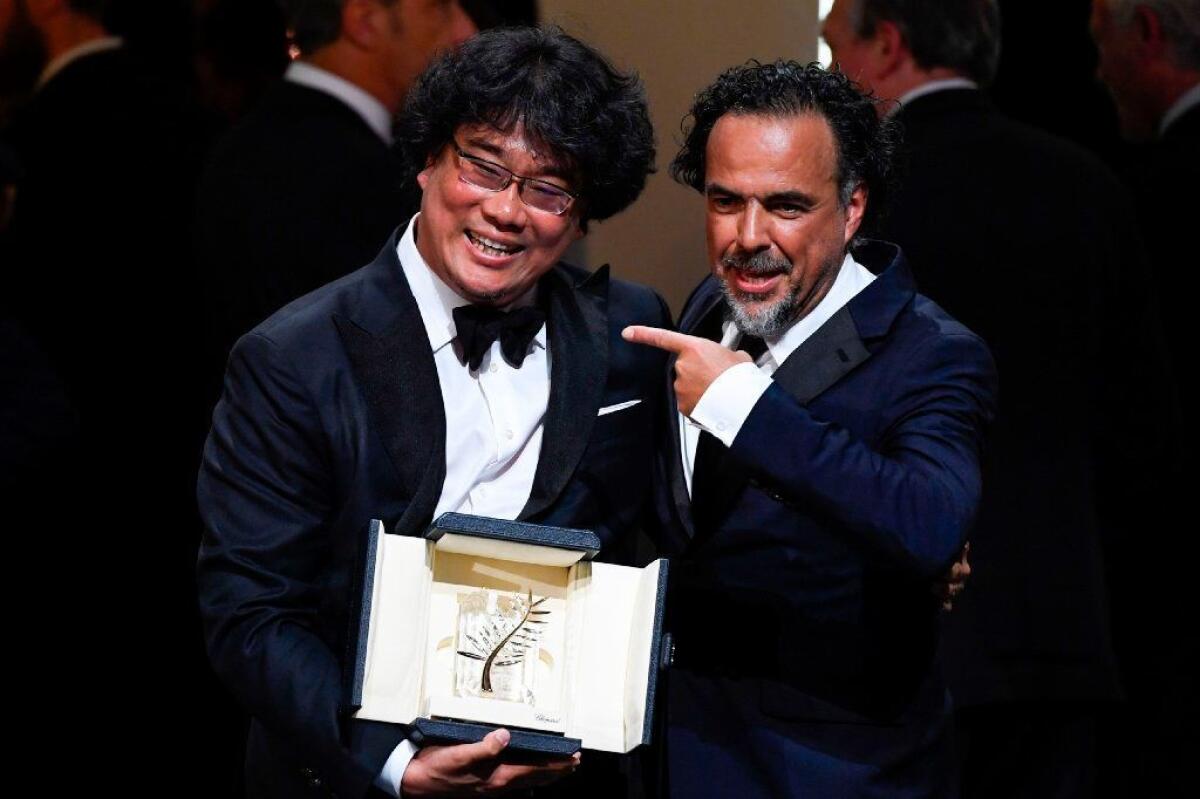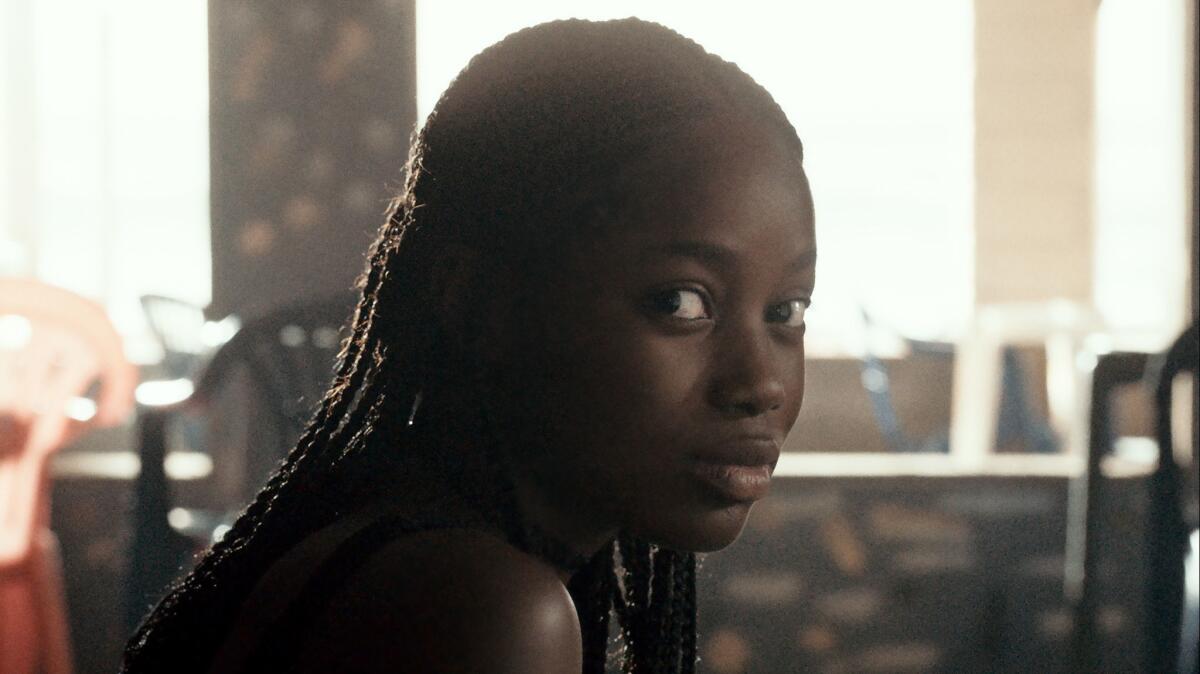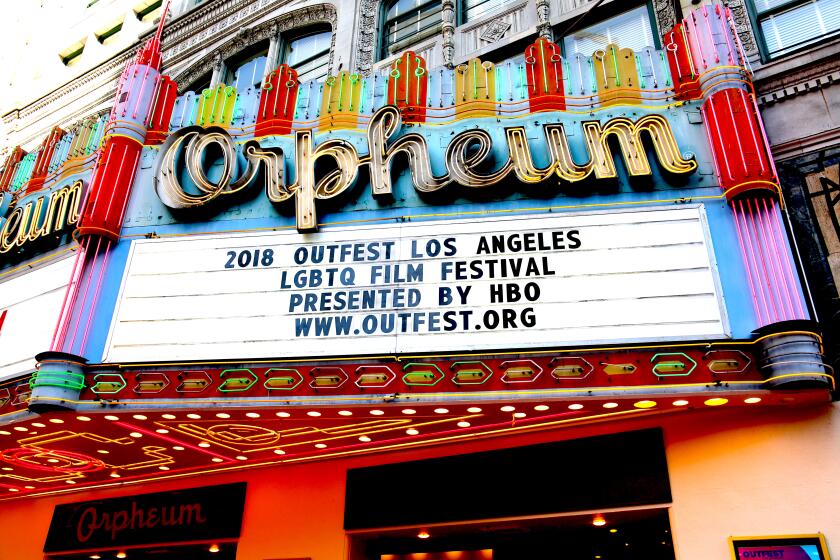One thing the Cannes Film Festival jury got right: Bong Joon-ho’s ‘Parasite’ victory

Times critic Justin Chang is filing dispatches from the 72nd Cannes Film Festival, which ran May 14-25 in France.
Bong Joon-ho’s “Parasite” is the best movie to win the Palme d’Or at Cannes since — well, last year’s winner, Hirokazu Kore-eda’s “Shoplifters,” a movie that it resembles in some very strange, funny and surely unintended ways.
Like “Shoplifters,” “Parasite” is a moving and suspenseful portrait of an impoverished family that resorts to some desperate, dishonest survival tactics. Unlike “Shoplifters,” it’s an insidiously creepy entertainment that swerves violently (but oh so beautifully) between tones and genres, building up a head of darkly comic steam before suddenly giving way to full-tilt horror and devastation. I’m deliberately writing around the plot, which is ingenious and twisted and worth discovering on your own when it makes its way into theaters worldwide.
“Shoplifters” was the sixth Japanese movie to win the top prize at Cannes; “Parasite” is the first South Korean movie to do so. All hail the competition jury, led by president Alejandro González Iñárritu, for rectifying that ridiculous oversight. The Bong d’Or, as it must henceforth be known, will mean a great deal to an industry that routinely cranks out some of the best genre cinema and art cinema around — or, in the case of “Parasite,” a superb hybrid of the two.
It is also a milestone for its director, who first came to Cannes 13 years ago with his sensational creature feature “The Host” — a movie that, as the titles cleverly suggest, is very much a companion piece to “Parasite.” (The two even share a lead actor, the great Song Kang-ho.) The years since have been productive but difficult ones for Bong, who had to suffer the indignities of working with the slash-happy Harvey Weinstein on “Snowpiercer,” and then found himself at the unhappy center of a widely publicized Netflix-Cannes feud with “Okja.” “Parasite,” his first Korean production since “Mother” (2009), is both a return to basics and a leap forward.
Few of those in attendance at Saturday’s closing awards ceremony would argue with the decision reached by Iñarritu’s jury, even if they were hoping for different outcomes. Besides “Parasite,” the strongest critical favorites were “Pain and Glory,” Pedro Almodóvar’s elegant and moving portrait of an aging Spanish director who may or may not be his alter ego, and “Portrait of a Lady on Fire,” Céline Sciamma’s gorgeously wrought romantic drama about two women making art and making love ahead of their late-18th-century moment.
A win for “Pain and Glory” would have been a well-earned career accolade for Almodóvar, who is one of the world’s most beloved auteurs and yet has never received world cinema’s highest honor. A win for “Portrait of a Lady on Fire” would have made Sciamma only the second female director to receive the Palme, after Jane Campion for “The Piano.”
Both pictures did receive consolation prizes: Antonio Banderas won the best actor award for his possibly career-best performance in “Pain and Glory,” while Sciamma took the writing honors for her playful and literate screenplay. As a deep admirer of both films, I wish they’d fared better, but there were surely worse outcomes. (One very good outcome: “Pain and Glory” will be released later this year by Sony Pictures Classics, while both “Parasite” and “Portrait of a Lady on Fire” were acquired for North American distribution by Neon.)
If there is a particular reason why “Parasite” prevailed, I think it’s because it delivered the competition’s single most original and entertaining approach to a subject — the rebellion of the underclass, the return of the repressed — that ran through many other films in competition, including several other prizewinners.
FULL COVERAGE: Cannes Film Festival »

The Grand Prix, or second place, went to “Atlantics,” Mati Diop’s elliptical and enigmatic drama about Senegalese refugees and the women they leave behind. It’s the migrant crisis with a supernatural hook, and a significant triumph for the first black female director ever to compete at Cannes. (Netflix scooped up rights to the film in most territories worldwide just as the fest was coming to a close.)
The jury prize, or third place, was shared by Ladj Ly’s debut “Les Misérables” and Kleber Mendonça Filho and Juliano Dornelles’ “Bacurau,” both rich, teeming social panoramas that contained intense passages of visceral filmmaking.
No less than “Parasite,” all three of these runner-up films tackle deep-rooted social ills through the prism of genre. Something similar could be said of “Young Ahmed,” which received the jury’s directing prize for Jean-Pierre and Luc Dardenne. The Dardenne brothers are as beloved figures in world cinema as Almodóvar, and their neo-neorealist aesthetic has been arguably much more influential. Their latest, a portrait of religious extremism in the guise of a thriller, was not one of their finest. But it does have the brothers’ usual shivery command of suspense, which makes its dearth of psychological insight all the more disappointing.
Based on the awards slate, one could surmise that Iñárritu’s jury was most moved by stories of the oppressed and marginalized, of which there were admittedly many in this year’s competition. Witness their special mention for “It Must Be Heaven,” Elia Suleiman’s lovely, wistful, globe-trotting comic riff on Palestinian identity. Witness too their apparent disinterest in some of the competition’s auteurist indulgences — and I say that with great admiration for Terrence Malick’s “A Hidden Life” and Quentin Tarantino’s “Once Upon a Time … in Hollywood.”
Were they pursuing such an agenda to the fullest, of course, they might have been swayed by Diao Yinan’s thrilling and somber “The Wild Goose Lake,” whose blood-and-neon aesthetics are just dazzling enough to distract you from a persuasively bleak commentary on life in contemporary China. Or perhaps “Sorry We Missed You,” a well-received drama of working-class despair from two-time Palme winner Ken Loach. That movie, as it happens, is also about a family being torn apart by poverty and human indifference. It’s no “Shoplifters” or “Parasite” — this family is surely the noblest that ever lived — but they might make a particularly potent, even consoling triple bill, a reminder that just because people are dreadful, the movies don’t have to be.
RELATED: Justin Chang’s Cannes Film Festival diary 2019 »
More to Read
Only good movies
Get the Indie Focus newsletter, Mark Olsen's weekly guide to the world of cinema.
You may occasionally receive promotional content from the Los Angeles Times.











